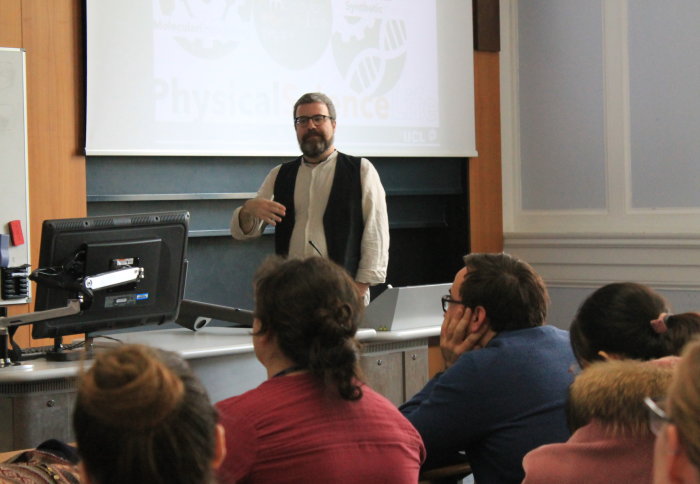How can we make drug delivery more precise?

Professor Giuseppe Battaglia is Chair of the Molecular Bionics group in University College London
The latest IMSE Highlight Seminar discussed how better molecular engineering could lead to more precise medication.
The most important feature of any drug is its ability to interact with its target in the human body as selectively as possible. However, current medicines typically use a "one size fits all" approach. In the future, it is envisaged that more precise medicines will be tailored to the individual. This is according to Professor Giuseppe Battaglia, Chair of the Molecular Bionics group in University College London.
Magic bullet
Recent years have seen significant advancements in the precision of drug delivery to patients. This has largely been due to a combination of a greater understanding of biology and material.

An example of this is in the designing of responsive materials, materials that can respond to different stimuli from the body. For example, scientists can assemble a drug at neutral pH, which then dissolves when exposed to a particular pH in the body - an important development for drug delivery.
Navigating the brain
The most significant advances in drug delivery has been in relation to the brain. According to Professor Battaglia, the brain is very interesting due to the fact that although it is only 2% of weight, it uses a much larger proportion of the nutrients, about 20-25%, and about 60% of glucose intake. However nearly all drugs cannot be used in the brain.
Scientist have discovered that using vesicles (small fluid filled sacs that have tuneable mechanical properties) can be used to transport and deliver drugs to the brain. Ensuring that medicines interact exclusively with the particular cells desired (e.g. cancer cell), and other, healthy, cells is done via the careful molecular drug design.
Previously accepted methodology is to screen for the molecule that binds the strongest. However, Professor Battaglia is challenging this methodology. He has made progress in understanding how to control binding of the vesicle, and how to make it travel across the blood-brain barrier using very fast super-resolution spectroscopy to follow the vesicle. This approach needs just the right amount (or "Goldilocks" amount) of binding to get into blood-brain barrier and escape.
Biography
Giuseppe, or as most people call him, Beppe, Battaglia is an EPSRC Established Career Fellow and 2018 ERC-CoG investigator, the Chair in Molecular Bionics in the Department of Chemistry and Honorary Professor of Chemical Engineering at the Department of Chemical Engineering at the University College London (UCL). Beppe is part of the Institute of Physics of Living System at UCL and he is the director of the EPSRC/Jeol Centre for Liquid Phase Electron Microscopy. In 2019, Beppe was awarded a presetgius Catalan Institution for Research and Advanced Studies (ICREA) chair to join the Institute of Bioengineering of Catalunya (IBEC) part of the Barcelona Institute of Science and Technology. Beppe will divided his time between UCL and BIST for the next 5yrs. Prior to joining UCL, Beppe held positions as Lecturer -2006, Senior Lecturer -2009 and Professor -2011 in the Departments of Materials Sci. Eng. (2006-2009) and Biomedical Science (2009-2013) at the University of Sheffield. Beppe has published over 100 research articles, reviews and book chapters and he is named inventor in 10 patents. Beppes is co-founder and serves as Chief Scientific Officer of two start ups, SomaServe ltd and SomaNautix ltd. Beppe was awarded the 2009 HFSP Young Investigator Award jointly with Prof A. Engler from UCSD, the 2011 APS/IoP Polymer Physics Exchange Award Lecture, the 2011 GSK Emerging Scientist Award, 2011 ERC Starting Grant, the 2012 Award for special contribution to Polymer Therapeutics, the 2014 RSC Thomas Graham Award Lecture, 2015 SCI/RSC McBain Medal for Colloid Science and the 2016 Anhui 100 Foreign Talent Award.
Article text (excluding photos or graphics) © Imperial College London.
Photos and graphics subject to third party copyright used with permission or © Imperial College London.
Reporter
Dr Kieran Brophy
Faculty of Engineering